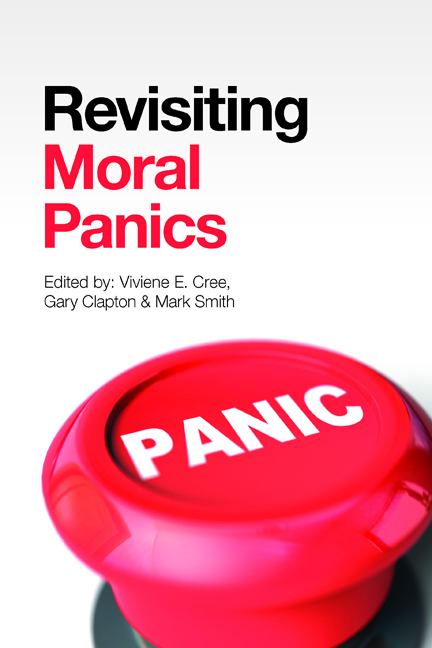Book contents
- Frontmatter
- Contents
- Contributors
- Preface
- Commentary moral panics yesterday, today and tomorrow
- Part One Gender and the family
- Part Two Moral panics in our time? Childhood and youth
- Part Three The state, government and citizens
- Part Four Moral crusades, moral regulation and morality
- Afterword the moral in moral panics
- Conclusion Moral panics and beyond
- Index
Afterword the moral in moral panics
Published online by Cambridge University Press: 08 March 2022
- Frontmatter
- Contents
- Contributors
- Preface
- Commentary moral panics yesterday, today and tomorrow
- Part One Gender and the family
- Part Two Moral panics in our time? Childhood and youth
- Part Three The state, government and citizens
- Part Four Moral crusades, moral regulation and morality
- Afterword the moral in moral panics
- Conclusion Moral panics and beyond
- Index
Summary
‘Panic’ is a theme I am familiar with in my work with women who regularly experience extremely distressing situations. It is a natural response to fear, and one that can be managed. Panic of itself is, arguably, morally neutral; how panic is fuelled, steered and exploited is not. Woven through the discussion in this chapter is an interest in moving toward a productive understanding of the function of ‘moral panic’, in order that it might create stimulus for positive change rather than being steered towards the imperative to cling to problematic norms. This interest underpins the discussion of themes derived from the chapters in this part: the constitution of ‘the deviant other’ and the discharge of moral responsibility. I then consider the Scottish Government's policy on violence against women, Equally Safe (Scottish Government, 2014a), to explore how such themes become operationalised in the context of my practice as a criminal justice social worker in a ‘women’s’ service.
Themes
Each of the chapters in Part Four has illuminated a view of the ‘undesirable other’ as a prerequisite for ‘moral panic’. Furedi's Chapter Sixteen focused on the contemporary ‘other’, ‘the paedophile’; Benson and Charsley, and Clark, in Chapters Eighteen and Nineteen, respectively, highlighted the ‘othering’ of those who are perceived as ‘not like us’ for reasons of cultural difference. These three are, arguably, the most emotive of panics discussed, as they portray clearly recognisible human actors who become readily stereotyped as a homogeneous group. Grumett's discussion of animal welfare in Chapter Seventeen is another emotive topic, as those believed to mistreat animals readily become associated with other immoral practices. In Chapter Twenty, Payne at the outset acknowledges that the debate on assisted suicide has attracted a more considered discussion, perhaps due to the lack of a ‘deviant other’ onto whom moral problems can be discharged.
The morality of ‘othering’ and the devastating effects that this has on individuals, communities and society as a whole have been widely discussed. Post-colonial scholars (Said, 1994; Fanon, 2008) identify significant disadvantages experienced by people who do not conform to the white, western ‘norm’. The woeful legacy of colonisers who used the moral imperative to civilise deviant others has endured for centuries and is starkly visible in the contemporary humanitarian crises in Palestine and across Africa.
- Type
- Chapter
- Information
- Revisiting Moral Panics , pp. 253 - 260Publisher: Bristol University PressPrint publication year: 2015



